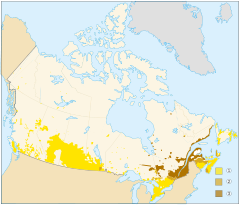English Canada

English Canada comprises the component of the population within Canada that speaks English. English Canada covers nearly the entire country except Quebec; thus, it is often used as an umbrella term for the country sans Quebec. English Canada is synonymous with the "rest of Canada" (ROC) in this context.
History
[edit]The English were among the first Europeans to arrive in what is now Canada.[2] After the Seven Years' War, Britain now had hegemony over the land as New France was seceded to them as part of the Treaty of Paris.[3] From this point on, English settlements grew in British North America and a sense of an English nation came about,[4] later sparking negotiations of Confederation with the distinct nation that formed French Canada.
Prevalence
[edit]Knowledge of English remains widespread outside of Quebec.[5] Even after immigration to Canada focused less on British people, newcomers were still expected to learn either English or French in order to assimilate, a policy that remains enforced today.[6] 8 of 10 provinces are de jure or de facto English, while New Brunswick is bilingual and Quebec is French.[7][8]
See also
[edit]References
[edit]- ^ "2006 Census: The Evolving Linguistic Portrait, 2006 Census: Highlights". Statistics Canada, Dated 2006. Archived from the original on April 29, 2011. Retrieved October 12, 2010.
- ^ "English Canadians". www.thecanadianencyclopedia.ca. Retrieved 2024-08-25.
- ^ "Seven Years' War". www.thecanadianencyclopedia.ca. Retrieved 2024-08-25.
- ^ "Gateway to World Englishes". www.ruhr-uni-bochum.de. Retrieved 2024-08-25.
- ^ "Why do Canadians speak French and English?". lestresorsderable.com. Retrieved 2024-08-25.
- ^ Immigration, Refugees and Citizenship Canada (2012-10-02). "Find out if you have the language proof for citizenship: Step 1". www.canada.ca. Retrieved 2024-08-25.
- ^ "History of Official Languages – OCOLNB – CLONB". Retrieved 2024-08-25.
- ^ "- Charter of the French language". www.legisquebec.gouv.qc.ca. Retrieved 2024-08-25.
